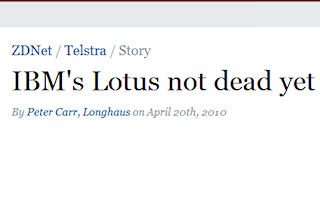
It seemed that just about every month last year another story would appear in the media about an account that IBM lost to Microsoft on the basis of a Notes-Exchange migration, with Defence and Qantas being some of the bigger names revealing plans to migrate away from the darling of Email 1.0 over the last few years.
Peter Carr (Credit: Longhaus)
Aside from these organisations, it has happened with such regularity and on such a scale that many casual business observers must be scratching their heads at the misfortune of Lotus and believing this to be just an example of how empires fall.
Our own research report entitled The Australian Enterprise Email Market received its fair share of press.
But IBM may not in fact be overly concerned about the plight of Lotus Notes in Australia. Instead, rather than sitting around waiting for the world to end, IBM has been putting to use a massive cash war chest to develop a suite of cloud-based collaboration services that are now being aggressively (for IBM, anyway) pushed into the market.
Today, collaboration is so much more than email.
In fact email is probably the least useful part of the modern collaboration toolkit. Sure when it isn't working life can seem pretty awful, but when it comes to personal productivity, email is the poor cousin, or the long-retired movie star of the enterprise collaboration portfolio.
Consider instead the necessity for document work flow and content management in major organisations today for which email is simply the most common delivery shell. Consider also the rise of instant messaging, portals and social technologies. Consider online conferencing and the rich communication-enabled user interfaces of business applications of today's CRM and accounting packages.
Within this context, point victories within a holistic collaboration suite are no longer a basis for claiming market victories. For example, if one is to point a finger at the changing fortunes of Lotus for email, then based on our experience in the collaborative portal market of late, one must also point their finger at the changing fortunes of Microsoft through SharePoint.
While seemingly relinquishing their enterprise-direct position for email solutions in the Australian market to Microsoft, it appears that Lotus has found renewed energy in delivering the well-known collaboration brand not only on-demand direct from the cloud, but also through their well established partner-networks. And over the past few years Longhaus has increasingly seen the importance to Lotus of its IBM partner network whether through improved global programs or simply in the solid performance of other key IBM brands such as Domino and WebSphere in the back office.
On the front-end, Australian organisations have had no opportunity to procure Lotus Notes through a hosted environment and their client-direct strategy has failed to competitively penetrate the physical and mental bastions of corporate Australia. In fact, much the same can be said for Europe. IBM has simply not pursued that route. Negotiations were even stalled with Telstra in the last 18 months for the delivery of an as-a-service Notes product through the first iteration of T-Suite.
Following a swag of new announcements at Lotusphere in 2009, IBM began releasing Lotus directly from the cloud in a service known as LotusLive. It offered not just email but a range of collaborative solutions for organisations, their customers and also their supplier networks.
A full year later at Lotusphere 2010 it was then announced that IBM would begin pushing LotusLive services directly through its business partner networks, and for Australia that announcement may prove significant in the revival of Lotus fortunes regardless of how well the brand has performed over the past few years.
From a business partner network of hundreds of local and international companies, in the Lotus solution space alone that will equate to more than 50 independent software vendors, systems integrators, and application development companies that can now fly the flag and on-sell Lotus' on-demand collaboration suite. This may include well-known partner companies across the country including Dialog, Certus, e-Centric Innovations, ISIS and Cirrus all the way up to Fujitsu, Dimension Data and Deloitte.
Outside of the incremental trails available to the business partners for on-selling of LotusLive, the current play by IBM is a very savvy one. The on-demand-through-a-partner sales strategy ensures that IBM will bring influence right to the door of many Australian mid-to-enterprise market clients. It will provide IBM downstream strength through direct partner involvement in the accounts through managing the upgrades, maintenance, support and general strategies of the back-end Web Sphere and Domino environments which continue to give IBM and Lotus strength in the Australian collaboration market.
